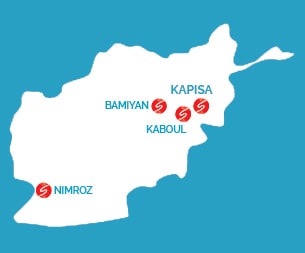In the summer of 2021, there were new developments in the humanitarian crisis that has affected Afghanistan for more than 40 years. After the withdrawal of foreign armed forces, the Taliban was able to seize power.
These events led to significant inflation, the cessation of certain development and budgetary aid programs, as well as the closure of Afghan borders – all creating a major socio-economic crisis. Many individuals have lost their jobs or experienced a significant decrease in income.
Food had also become scarce, and food prices have sharply risen. The Afghan population is consequently facing a grave food insecurity problem, with nearly 22.8 million people affected and experiencing reduced access to basic services. Many are additionally stuck in precarious living conditions that are especially deleterious in winter.
Some families have nothing left to keep them warm and have to burn anything they find in the street while they huddle under a few blankets for the night,” says Xavier Lauth, head of the Emergency Desk at INTERNATIONAL SOLIDARITY.
EMERGENCY ACTIONS
To aid the most vulnerable people, SOLIDARITÉS INTERNATIONAL continues to carry out emergency action in Kabul and in the provinces of Bamiyan and Kapisa. Some 1,600 families have been supported via our programs to stay warm and get through the winter.
Families have received support in the form of a cash Afghanis or approximately 115 euros (according to daily rates). With this money, these families can buy necessary resources to survive through the winter such as fuel for heating, warm clothes, or food.
By distributing money, the individuals affected have the autonomy to choose what products are most crucial for their specific situation. This program ensures human dignity and the emancipation of the population,” explains Xavier Lauth.
Afghanistan
Context and action- 43 inhabitants
- 180th out of 191 countries on the Human Development Index
- 146.500 people helped
Our teams also plan to rehabilitate water resources in the capital so that a greater number of people can have access to drinking water and hygiene resources, thus reducing the risk of spreading epidemics and water-borne diseases.
BAMIYAN, KAPISA and KABUL
Our current actions primarily concern the provinces of Bamiyan and Kapisa, but they may extend to other provinces depending on the assessed needs of those areas and the evolution of this humanitarian crisis.
The provinces of Bamiyan and Kapisa were initially chosen because there was a lack of humanitarian actors and programs present in the territories, and the harsh winter has led to grave conditions and geographical isolation. “These are mountainous regions, where it is sometimes necessary to travel up to three days on the back of a donkey to reach the center of the province and its services,” adds the manager of the Emergency desk. We also operate in certain precarious housing areas of Kabul where the population – partly made up of families who have been driven out by the conflicts of recent years – live in difficult conditions and have been gravely affected by the economic collapse of the country.

